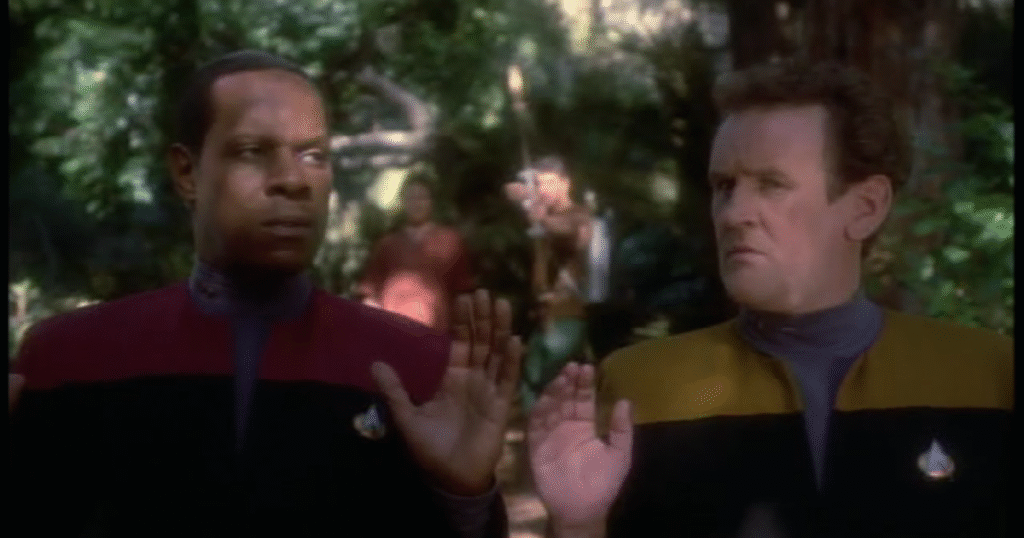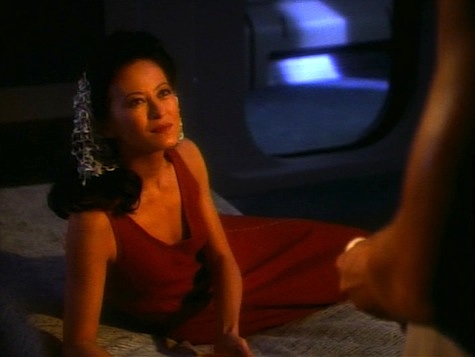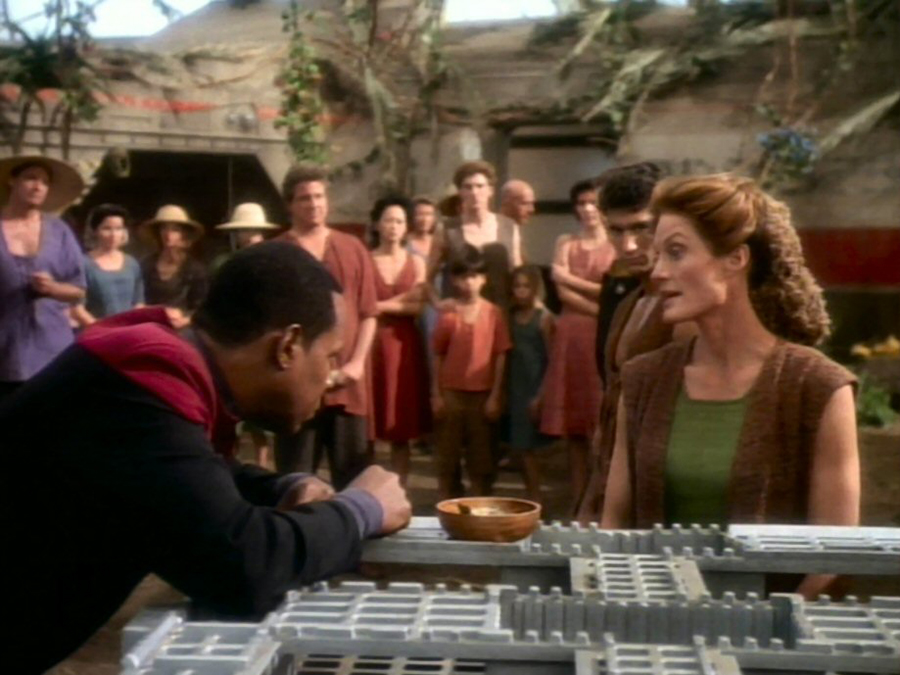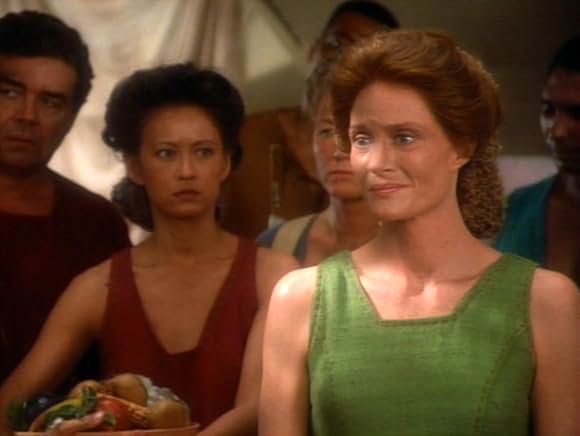When I finish a TV series, I usually take a break for a few months before I begin rewatching the series very slowly. I’m pretty methodical in my rewatch, I tend to skip episodes I didn’t love, and I don’t stress myself on needing to see every moment. I just enjoy an episode, somewhat in order, whenever the mood strikes me.
Lately, I’ve felt a desire to watch Deep Space Nine, for the first time in several years. I struggled to remember exactly where I left off, but I decided to watch Paradise, one episode that really stood out to me during my initial watch. I was surprised to see it rated so low on IMDB, because like all good episodes of Star Trek this is an episode that looks at a complicated issue where there is no real right or wrong.
I’m going to spoil this episode, because there is no way for me to discuss the element of the show, I want to discuss without doing so. This is your warning.
Paradise is a simple story. Commander Sisko and Chief O’Brien stumble upon a planet that shows signs of human life, but no technology. They beam down to the planet’s surface and find themselves stranded. None of their technology works on this planet. Not long after beaming down, they encounter the settlers, a group of people whose Starfleet vessel crashed ten years prior and found themselves in a similar state. No technology worked, so they were forced to adapt and embrace a simpler, back to the elements style of living.
In what one might call an idyllic situation, this close-knit group of settlers farm the land, eat together, and work together. They have built a community without the luxuries of the modern world. They even agreed on a harsh punishment to keep the community in line, individuals who break the rules find themselves trapped in a metal box where they suffer the heat while contemplating their crimes.
Something appears off almost from the beginning to Sisko and O’Brien. While the settlers (maybe better described as survivors) have built a life for themselves that seems rewarding, their leader, Alixus, seems more concerned with keeping Sisko and O’Brien on the planet to help their community grow. The addition of two strong males would be helpful, and she continues to pressure Sisko to remove his Starfleet uniform and even goes as far as to send a beautiful young lady to his quarters to try and seduce him into making a life on the planet.
As the story unfolds, Sisko discovers that Alixus held strong anti-technological beliefs even before they crash-landed on this planet. She is very opinionated on how mankind has evolved and sees herself as a person to lead mankind back to the basics, back before all the pesky technology interrupted the natural flow of things.
Sisko is sentenced to the metal punishment box as O’Brien tries to figure out what is going on. He discovers a device that renders all technology useless that was installed by Alixus and her son. Alixus was able to contact the runabout that Sisko and O’Brien had arrived in, and she sent it off into space to collide with a star. Luckily, her calculations were off, and Dax and Kira were able to catch the runabout and trace back its path to the planet.
Alixus and her son are arrested for various crimes including allowing a young girl to die while Sisko and O’Brien were on planet. A simple tricorder could have cured her disease. The remainder of the settlers decide to stay on the planet and live the life they now enjoy. They weren’t even sure if they were going to turn the technology blocking device off or not.
So, what’s the big takeaway from this story? Well, I think the first thing we have to address is technology. A lot of people, including myself, think less technology is better. The biggest difference in the technology of today and say the technology of Star Trek is that technology is used more like a tool in the future, and less of a distraction. That’s not to say folks didn’t get obsessed with Holodeck programs and I could see Sisko yelling at Jake for spending too much time on his PADD, but the fictional society they exist in didn’t farm their every movement and auction off their data in an attempt to manipulate the user into spending currency like we deal with today.
But did Alixus have a point? Did the people of Starfleet lose something when they allowed technology to infiltrate every element of their life? Possibly so.
It’s clear for the most part the settlers were happy and while they suffer because they lack things like replicators to make food or tricorders to help heal the sick, they have pride in their work. They are able to build things with their hands, and I can see how rewarding that would be in the future. Heck, it’s rewarding now. I get more satisfaction out of fixing a small issue on my car, than I do six month’s worth of my paper pushing job.
I think it’s important to note that the settlers decided to stay and continue living the life they had made. I sometimes wonder if I found myself in a similar life, would I enjoy it? Would I sacrifice my cell phone for a simpler life? Then again, is all that hard work truly simple? I certainly have no interest in giving up my air conditioner.
While we have on-going debates about technology and its place in our world every day, I think the most interesting and scary part of this story was Alixus. She deemed herself smarter than everyone else. In her mind, her ideas were the only right ideas. She orchestrated the crash of their ship. She brought along a device to render all technology useless, and in the process, she allowed (what we would assume) dozens of people die from disease and starvation to meet her vision of the world. This is the most troubling part of this episode, partially because it feels so accurate in today’s world between our political leaders and even online groups. This inability to allow people to make their own decisions or see different points only results in feeding the narcissists and the mentally ill into thinking they are superior in some way. When that sort of thinking is encouraged, people tend to get hurt.
Paradise doesn’t give us an answer to how best to live our lives. It doesn’t say technology is better, or worse. Instead, it shows both sides and allows the viewer to make a decision for themselves. Of course, the middle way is usually the best way, and maybe that’s the big takeaway. A life without technology can be harsh, but a life with too much technology can be isolating. Maybe we need to find some balance between the two.
If you would like to read a more in-depth exploration of the various themes of this episode, I recommend Star Trek: Deep Space Nine – Paradise (Review).



